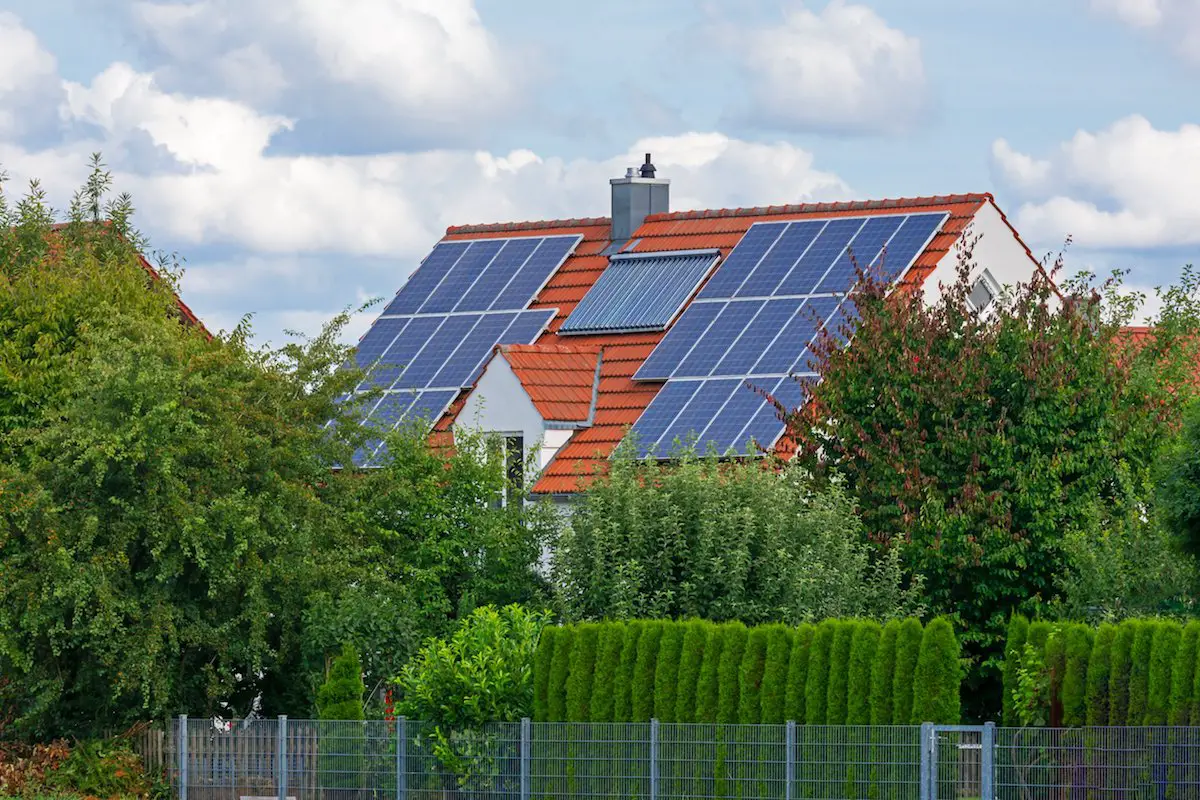Which Trees Are Best to Plant for Privacy?
If you are looking for ways to improve the privacy around your home, you may be considering planting trees or building a fence. There are pros and cons to both options but in this blog post, we will focus on the benefits of planting trees. Trees can provide privacy and security for your home at a fraction of the cost of installing a fence. They also have other benefits, such as improving air quality and reducing energy costs. With so many tree species and endless information out there, it can be hard to know for sure what type of tree to invest in for privacy.
So here is our list of the best trees and plants for privacy:
- Leyland Cypress
- Bamboo
- Ivy
- Laurel
- Thuja Green Giant
- Sky Pencil Holly
We will go over each of these trees and plants in detail so you can make the best decision based on your needs. We will also touch on how to care for privacy trees and plants, as well as the potential drawbacks of using them for privacy. So read on for everything there is to know about using plants and trees for privacy!
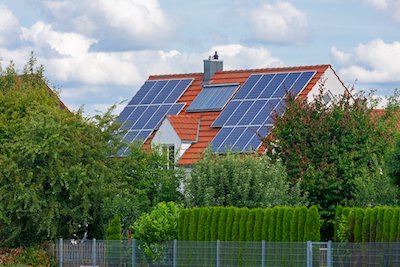
1. Leyland Cypress
The Leyland cypress is a fast-growing evergreen that can reach up to 60 feet in height. It is a popular choice for privacy hedges since it provides dense coverage and can be easily trimmed to the desired height. And because it is an evergreen, you will get great privacy year-round. Leyland cypress is also relatively low-maintenance, although it does require regular watering and fertilization to keep it looking its best.
There are a few different varieties of Leyland trees to choose from, so be sure to do your research to find the one that is best suited for your climate. It is best to plant Leyland trees in the spring or fall so they have time to establish themselves before the hot summer months. Another advantage of the Leyland cypress is that it is deer-resistant, so you don’t have to worry about them eating your new privacy hedge!
One potential drawback of the Leyland cypress is that it is susceptible to disease and pests, so it may not be the best choice if you live in an area with a lot of insects. Another disadvantage is that it can be messy, as the leaves and branches tend to drop a lot. Overall, the Leyland cypress is a good choice for those looking for an easy-to-care-for privacy hedge. And since young Leyland trees can be found for as little as $30, these trees can save money over constructing a privacy fence.
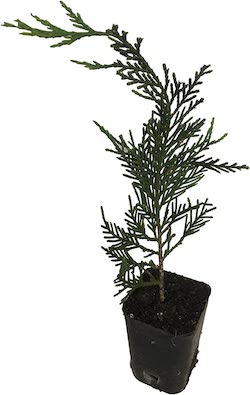
2. Bamboo
Bamboo is a fast-growing grass that can reach up to 20 feet in height. It is a popular choice for privacy hedges since it provides dense coverage and can be easily trimmed to the desired height. Bamboo thrives in most climates and is very low-maintenance, although it does require regular watering and fertilization to keep it looking its best.
One advantage of bamboo is that it grows quickly, so you will get privacy in no time! Another plus is that bamboo is very versatile and can be used in a variety of different ways. For example, you can use it to create a privacy fence, screen, or hedge. And because bamboo is so dense, it provides excellent privacy. However, one potential drawback of bamboo is that it can be invasive, so make sure to plant it in an area where it won’t spread. Another possible disadvantage is that it can be noisy in windy weather, as the leaves rustle against each other.
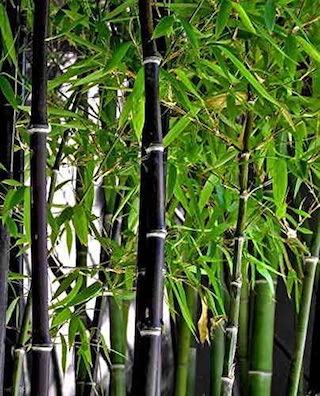
3. Ivy
Ivy is a fast-growing vine that can reach up to 30 feet in length and it is well-loved for privacy hedges because it is a unique and beautiful plant that provides dense coverage. Also, ivy is very low-maintenance, although it does require regular watering and fertilization to keep it looking its best. Ivy needs to be planted in the spring or fall so it has time to establish itself before the hot summer months.
One advantage of Ivy is you have many different varieties to choose from. Another pro is that it can be trained to grow in a variety of shapes and sizes, making it very versatile. Also, ivy provides excellent privacy since it is so dense. However, one potential drawback of Ivy is that it can be invasive, so make sure to plant it in an area where it won’t spread. Another possible disadvantage is that it can be messy, as the leaves and branches tend to drop a lot.
Another thing to consider before planting Ivy is that it is poisonous to pets and children, so if you have either of these in your home, you may want to choose a different plant for your privacy hedge. Overall, Ivy is a good choice for those looking for an attractive and unique privacy plant that is also evergreen so you won’t lose your privacy in the winter.
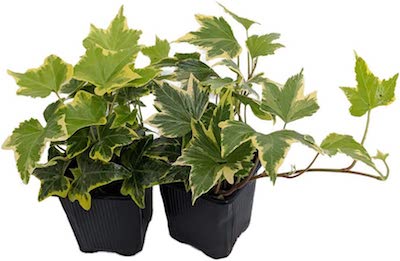
4. Laurel
The laurel is an evergreen shrub that can reach up to 20 feet in height. Laurel is a popular choice for privacy hedges because people love its glossy, dark green leaves. Also, the laurel is very low-maintenance, although it does require regular watering and fertilization to keep it looking its best. Laurel prefers to be planted in full sun but can also tolerate partial shade.
One advantage of Laurel is that it is very dense, so it provides excellent privacy. Another pro is that it can be trimmed to any desired shape or size. Laurel also has a long lifespan and is relatively pest and disease-resistant. However, one potential drawback of Laurel is that it is an aromatic plant, so the leaves may release a strong fragrance that some people find unpleasant. Overall, Laurel is a good choice for those looking for an evergreen privacy hedge that is easy to care for and provides dense coverage.
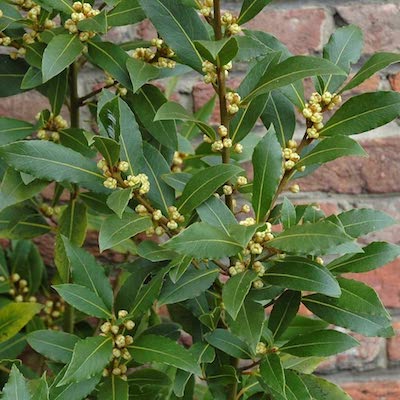
5. Thuja Green Giant
The Thuja Green Giant is an evergreen tree that can reach up to 100 feet in height. Thuja Green Giant is a popular choice for privacy hedges because it grows very quickly (up to three feet per year!) and provides dense coverage. Thuja Green Giant is great for cold climates but can also tolerate some heat and drought. They prefer full sun to partial shade and need to be watered regularly to look their best.
One advantage of Thuja Green Giant that you may like is that it is a fast-growing tree, so you will get privacy in no time! Another plus is that Thuja Green Giant is very tolerant of different climates and soil types. However, one potential drawback of Thuja Green Giant is that they do in fact grow very large so it is important to plant them at least 20 feet away from your house or other structures. Another thing to keep in mind is that Thuja Green Giant is an evergreen tree, so it will block your view year-round if that is something you are concerned about.
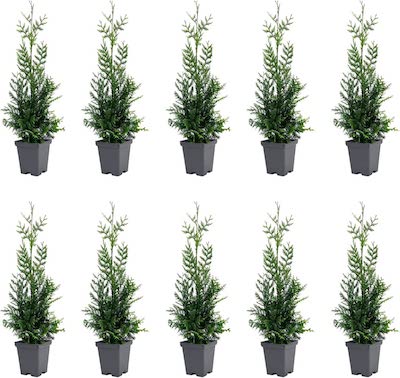
6. Sky Pencil Holly
This fast-growing tree is a great option if you’re wanting to mimic the look of a fence without the construction. Sky Pencil Holly can grow up to three feet per year and reaches a mature height of about 20 feet tall, making it a great choice for smaller yards. Depending on the variety you get, they are also quite thin, so they won’t take up a lot of space. Sky Pencil Holly prefers full sun but can tolerate some shade and needs to be watered regularly.
One advantage of Sky Pencil Holly is that it is very thin, so it won’t take up a lot of space in your yard. Another plus is that it grows quickly, so not only will it provide a beautiful green perimeter, but Holly trees can save money over constructing a privacy fence. One disadvantage of Sky Pencil Holly is that it is not as dense as some of the other options on this list, so if you are looking for complete privacy, this may not be the best tree for you.
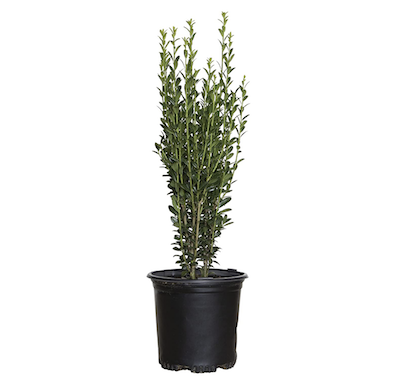
Trees vs. Fencing
Now that we have gone over all of the best types of trees and plants that can provide privacy, you may be wondering if a tree is really the best option for you. After all, a fence will provide complete privacy, right? While this is true, there are several advantages and disadvantages to both options that you should consider before making your final decision.
Trees Advantages:
- They are living, so they provide oxygen and help to clean the air
- They provide shade and can help to cool your home in the summer
- They can be a natural barrier to sound
- Trees add value to your property
Fencing Advantages:
- Fences require less maintenance than trees
- Fences can be customized to your exact specifications
- You can choose the material of your fence to match the style of your home
- Fences can provide complete privacy
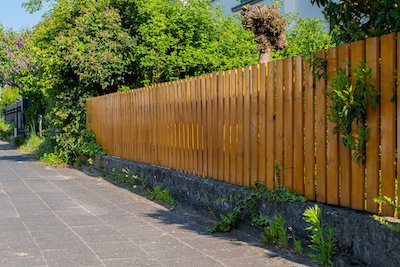
Trees Disadvantages:
- They can take years to reach their full height
- Trees need regular maintenance, including pruning and watering
- Trees can be damaged by severe weather
- Trees can be a liability if they fall on your property
Fencing Disadvantages:
- They can be expensive to install
- They may need to be replaced after a few years
- They can block your view
- Some people consider fences to be an eyesore
As you can see, there are pros and cons to both trees and fences. It really comes down to personal preference and what is best for your specific needs. If you want complete privacy right away, then a fence may be the best option for you. But if you don’t mind waiting a few years, want the pretty greenery, and like the idea that trees can save money over constructing a fence, then get planting!
Related Questions
How do I choose the best tree for my yard?
When choosing a tree for your yard, you should consider the size of the tree at maturity, the climate it will grow in, the amount of sun or shade it needs, and how much water it will need. You should also think about what type of soil you have and whether the tree’s roots will damage your foundation or sidewalk.
How much does it cost to plant a tree?
The cost of planting a tree varies depending on the size and type of tree you want to plant. Smaller trees can be purchased for as little as $25, while larger trees can cost over $100.


